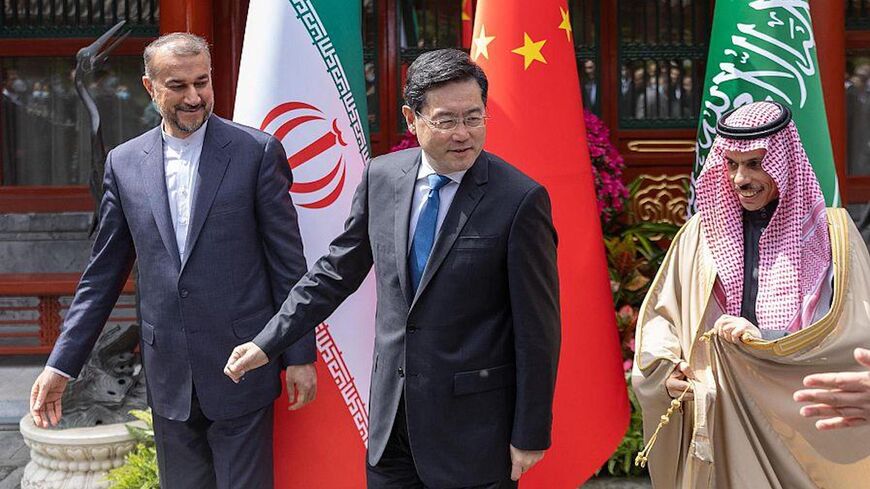Iran’s embassy reopened its doors in Saudi Arabia's capital, Riyadh, on Wednesday for the first time in seven years in the latest move toward normalizing full diplomatic relations between the two countries.
A Reuters witness said a team was inspecting the premises of the embassy as a white truck arrived at the gate.
The reopening came only hours after an Iranian technical delegation arrived in Riyadh.
“The Iranian delegation will take the necessary measures in Riyadh and Jeddah to set up the embassy and consulate general,” the spokesman of Iran’s Foreign Ministry said.
The Iranian Embassy in Saudi Arabia was shut down in 2016 after Saudi authorities asked the Iranian diplomatic mission to leave the kingdom in response to an attack against the Saudi Embassy in Tehran over the execution of a prominent Shiite cleric by the Gulf kingdom.
Tensions between the two countries had been building up after Saudi Arabia intervened in the Yemeni war in 2015 in support of the internationally recognized government against the Iran-backed Houthi rebels.
The Saudi-Iranian feud over the past years has fueled several conflicts across the region as the two countries engaged in proxy battles mainly in Yemen, Syria and Lebanon.
But in a major breakthrough last month, Saudi Arabia and Iran announced a China-brokered agreement to restore their diplomatic ties as the region witnesses major realignments.
Last week, the two country’s top diplomats met in Beijing in the first such meeting in more than seven years with the aim to advance their deal, which includes several steps to reinstate their relations, including the reopening of diplomatic missions.
A Saudi delegation arrived in Tehran on Saturday and will head to Iran's second city, Mashhad, on Thursday, according to Kanani.
The Saudi Foreign Ministry said the delegation is discussing the necessary mechanisms to reopen the Saudi Embassy in the Iranian capital and a consulate in Mashhad.
The recent Saudi-Iranian deal has put into question Washington’s traditional role in the Middle East with the emergence of China.
The United States had cautiously welcomed the deal when it was first announced.
“If this deal can be sustained […] and the war in Yemen can end [...], in the end we welcome that,” White House National Security Council spokesman John Kirby told a press briefing on March 10.
On Tuesday, US national security adviser Jake Sullivan and Saudi Arabia’s Crown Prince and de facto leader Mohammed bin Salman spoke on the phone about Iran and the recent peace talks between Saudi and Houthi officials.
According to a White House statement, Sullivan welcomed Saudi Arabia’s efforts to reach “a more comprehensive roadmap for ending the war” in Yemen and expressed Washington’s support for these efforts.
The US official also stressed the need to “maintain deterrence against threats from Iran and elsewhere.”
A Saudi high-level delegation was in the Yemeni capital, Sanaa, over the weekend where it met with Houthi officials as part of renewed attempts to end the war in Yemen.
Meanwhile, US Special Envoy for Yemen Tim Lenderking left for the Gulf region on Tuesday in a show of support for the peace efforts in Yemen. He is scheduled to meet with Saudi, Yemeni and other officials to discuss ways to reach a “durable cease-fire and inclusive, UN-mediated political process while ensuring continued efforts to ease the economic crisis and suffering of Yemenis,” according to the State Department.
US-Saudi relations have gone through a rough patch after President Joe Biden assumed office in January 2021. The latter had vowed to reassess Washington’s ties and arms sales to Riyadh over Mohammed’s alleged involvement in the killing of Saudi journalist Jamal Khashoggi at the Saudi consulate in Istanbul in 2018 and the kingdom’s involvement in the Yemeni war.
Tensions reached their peak after Saudi-led OPEC and its allies, known as OPEC+, announced in October 2022 cuts to oil production at a time the Russian war on Ukraine had disrupted global oil and natural gas supplies. The announcement was made a few months after Biden visited Saudi Arabia and was photographed fist-bumping Mohammed.







